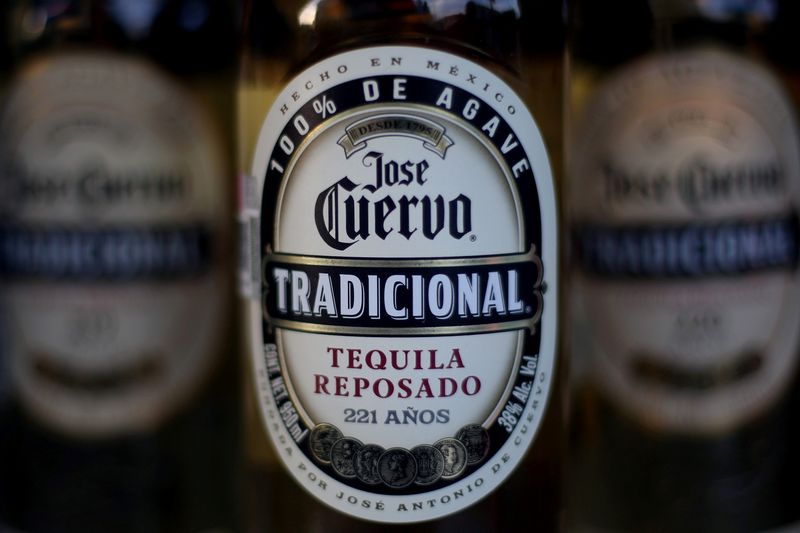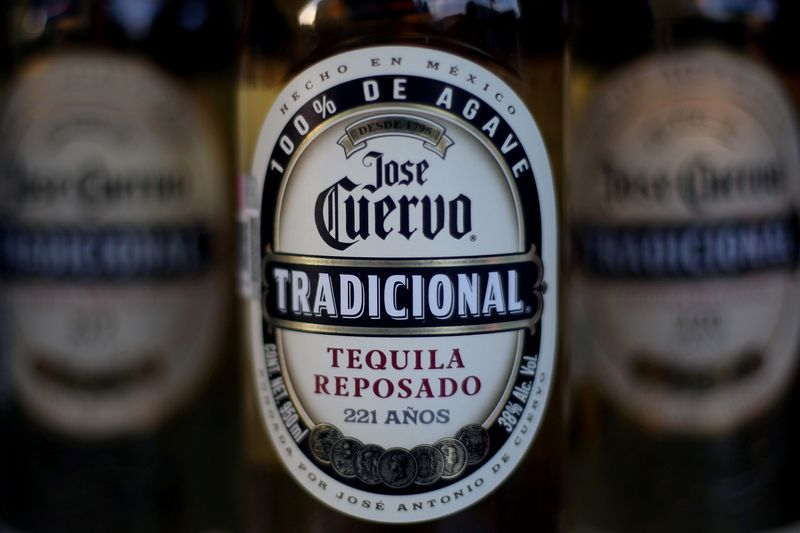
By Emma Rumney
LONDON (Reuters) – Some $3 billion in tequila and mezcal imports from top makers of the popular spirits, Diageo (LON:DGE) and Jose Cuervo owner Becle, are at risk from U.S. President-elect Donald Trump’s planned tariffs on Mexico, according to Mexican customs data reviewed by Reuters.
Trump, who takes office on Jan. 20, has said he will slap 25% tariffs on imports from Mexico and Canada, as well as additional duties on Chinese goods, which would hit companies in sectors from autos to retail.
These would also drive up the cost of importing spirits that cannot be made elsewhere, such as tequila, which is used in cocktails like margaritas and growing in popularity globally after taking off in the United States, as well as mezcal. Like French champagne or Italian parmesan cheese, products using the names tequila or mezcal must be made in Mexico.
That leaves companies like Diageo, the world’s top spirits maker, and Mexican firm Becle, the largest tequila producer, exposed. Together, they dominate the U.S. market for the agave-based drinks, and rely heavily on tequila sales in the U.S. for growth.
Diageo subsidiaries shipped over 25 million litres of tequila from Mexico to the U.S. last year, including brands Don Julio, Casamigos, DeLeon and 21 Seeds, according to Mexican export data provided exclusively to Reuters by ImportYeti.
That equates to a total of 33.7 million 750 millilitre bottles, Reuters calculated. The data references various editions of each brand, from the cheapest ‘blanco’ versions to far more expensive labels like Don Julio 1942, which sells for $139.99 per 750 ml bottle at large U.S. spirits retailer Total (EPA:TTEF) Wines & More, offering the most detailed insight yet into the value of imports exposed to the tariffs.
Based on the prices per 750 ml at Total Wines & More, one of Diageo’s largest U.S. customers, the U.S. tequila imports recorded in the data would be worth almost $1.6 billion.
A similar analysis of Becle’s U.S. shipments of eight tequila or mezcal brands found they also had a sales value of almost $1.6 billion.
Campari (LON:0ROY) Group, the next largest listed spirits maker with a popular tequila brand in the U.S., sent tequila with a sales value of just $122 million, Reuters analysis found.
Diageo said it had decades of experience navigating trade policy and has always taken trade disputes in its stride. “We will work with the incoming administration on issues that affect our business,” it said.
Becle did not respond to requests for comment. Campari declined to comment.
Reuters analysis shows just how much is at stake for top producers that dominate the U.S. tequila and mezcal markets if tariffs come into force. U.S. industry imports totalled $4.6 billion in 2023, up 160% since 2019, according to the Distilled Spirits Council of the United States (DISCUS), which has warned the tariffs would cost jobs.
DISCUS separately said it planned to seek an exemption to Trump’s proposed universal tariffs of 10% on all foreign goods.
PRICE HIKES
Diageo also sold at least $483.4 million in Canadian whisky in the year to end-November, according to Circana data covering U.S. store sales, leaving it doubly exposed to tariffs via imports from Canada.
Alongside tequila, its Crown Royal Canadian whisky sales make up another hefty chunk of its critical U.S. business, where slipping performance has prompted concern among investors.
Both Diageo and Becle, meanwhile, have been struggling amid slowing demand for expensive spirits as a boom seen during the COVID pandemic evaporates.
In the U.S., cheaper tequila brands like Kendall Jenner’s 818 Tequila have been gaining market share, while pricier labels like Diageo’s Casamigos have lost out as consumers become more price conscious.
Reuters’ analysis based the value on prices for standard size bottles at U.S. online liquor stores. Where it was not possible to determine the brand or sub-brand contained in shipments, Reuters assumed they contained the cheapest possible bottles.
In reality, shipments contain different sized bottles to be sold at different price points, including in venues like bars where they fetch a significantly higher margin.
While a 25% hit to $1.6 billion in sales would amount to $400 million, tariffs are usually based on import value rather than sales prices. Companies would also take actions to mitigate the tariff impact, such as hiking prices, said Joseph Gabelli, a portfolio manager at Diageo investor Gabelli Funds.
Jefferies analysts estimated in November that prices would have to rise 10% to offset the impact of a 25% tariff.
At least with tequila and mezcal, tariffs would not put certain firms at a competitive disadvantage, Gabelli said.
The question is whether U.S. drinkers would swallow any price rises, he continued.
“Does it cause a reduction in consumption if tequila becomes more expensive? Presumably there would be some negative effect,” he said.

